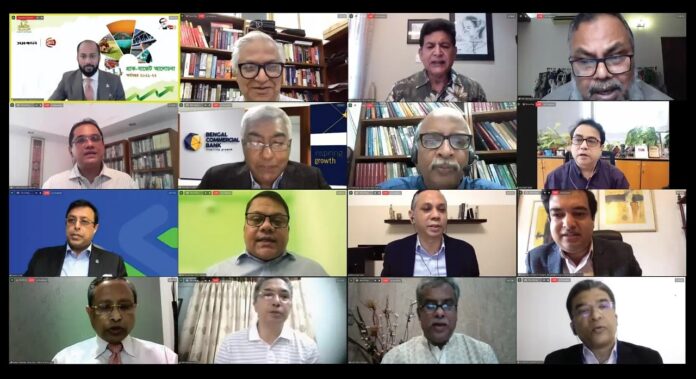Businessmen and economists at a pre-budget discussion today suggested the government for framing the next budget for FY22 considering the 2nd wave of COVID-19 pandemic and the fresh lockdown situation. The businessmen also urged the government to take effective and practical steps to continue production and domestic consumption in this tough situation as well as saving the small and medium enterprises from extinction.
They also called for reducing the tax and VAT rate at a rationale level and also for pursuing a business-friendly revenue management system. The participants at the virtual pre-budget discussion called for specific guidelines in the next budget for economic recovery as well as called for striking a balance between revenue targets and facilitating businesses.
Dhaka Chamber of Commerce & Industry (DCCI) in association with Daily Samakal and satellite Channel 24 organized the discussion FY2021-22 today virtually to outline the needs in the key macroeconomic avenues and roadmap of trade, industrial, investment recovery as well as turnaround of private sector from pandemic adversities. Dr. Mashiur Rahman, Adviser to the Prime Minister on Economic Affairs and Chairperson, BRAC Dr. Hossain Zilllur Rahman joined the discussion as special guests.
DCCI President Rizwan Rahman chaired and moderated the discussion. The discussion meeting was divided into four sessions namely — Financial Sector, Industry & Trade, Taxation & VAT and Infrastructure (energy, logistics & health). PM’s Economic Affairs Adviser Dr. Mashiur Rahman said that the growth should be inclusive while the economy needs to be widened with utilization of all the resources. For government, he said, achieving revenue target without hampering economic activities is a priority. He also suggested the stakeholders to arrange budget discussions round the year.
Regarding tax regime, Mashiur said it should be a business friendly one. “We should focus on increased revenue collection for development as well as need to facilitate and incentivize businesses. However, if revenue target is not achieved, development work will be halted,” He also said that quality and safe investment will reduce default loans adding a stable tax and duty regime for 7-10 years is a good move, but all investors may not get this benefit as investments do not come at the same time.
“Our tax-GDP ratio is comparatively low because our tax elasticity is low in the country due to rebates in different levels. But, a social acceptance of tax, VAT, SD and Customs duty rate need to be in place having global standard,” he added.
The Adviser also said that frequent changes in tax rate may hamper business growth. Rather, he suggested for increasing tax gradually mentioning a minimum time frame.
Chairperson of BRAC Dr. Hossain Zilllur Rahman said that the 2nd wave is going on and it may have a huge implication on the economy. “The next budget should also have a plan for recovery as it was in the last year. Moreover, social protection should get major concern in the next budget,” He said revenue collection and achieving the target is inevitable for a budget at the same time the government must consider incentives for the pandemic-hit the businesses specially the CMSMEs.
Zillur said disbursement of loan under stimulus for CMSMEs should be faster and in that case mobile financial services can be engaged as a delivery vehicle. “For the growth trajectory, domestic market needs to be incentivized beside the export sector as the domestic economy will be a growth driver,” He said there is a need for transition from cheap labour economy to skilled labour economy and a game changing policy review needs to be famed. “We have to focus on healthcare sector and we need more skilled nurse.
Urban poor are impacted heavily by the pandemic so budget needs an allocation as well as urban primary health care needs to be enhanced,” he added.
DCCI President Rizwan Rahman in his welcome address said that government will surely consider a business friendly, revenue friendly and industry friendly budget this year. “And the budget will have a clear indication for the economic recovery amidst the pandemic time. He also hoped that the next budget will have especial attention to taxation and VAT policy, infrastructure, industry and trade as well as financial sector,” he added.
Rizwan said that if the government with the help of vibrant private sector works hand in hand, Bangladesh will be able to recover its economic momentum despite the pandemic.
Stakeholders from various sectors including Senior Partner, KPMG, Adeeb Hossain Khan, Member, Customs Policy & ICT, NBR Syed Golam Kibria, NBR Member, VAT, Masud Sadik, NBR Member, Tax Policy, Md. Alamgir Hossain, CEO, IPDC, Mominul Islam, CEO, Standard Chartered Bangladesh, Naser Ezaz Bijoy, Rahel Ahmed, CEO, Nagad, Asif Ibrahim, Chairman, Chittagong Stock Exchange Ltd., Kazi Inam Ahmed, President, Bangladesh Supermarket Association, Md. Fazlul Haque, Former President, BKMEA, Md. Jashim Uddin, Vice Chairman, Bengal Group of Industries, Dr. Md. Masudur Rahman, Chairman, SME Foundation, Md. Faizur Rahman, CEO and MD, United Hospital Ltd, ASM Mainuddin Monem, President, Private Economic Zones Association of Bangladesh, Professor of BUET and Energy expert Dr. Mohammad Tamim, took part in the discussion.
Abul Kasem Khan, Chairperson, BUILD said if employments could be generated, additional tax rebate can be offered. He also suggested to look into the matter of reducing effective tax rate that is sometimes 45-50%.
Acting Editor, daily Samakal, Mustafiz Shafi in his concluding remarks said newspaper industry has to pay 37.5 percent corporate tax. The industry also pays 5 percent duty while importing newspaper. He thus wanted duty cut and reduction of corporate tax.
